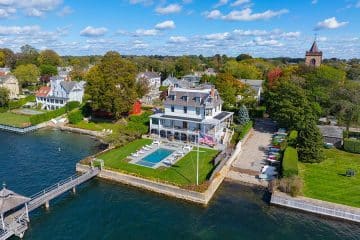The gleaming towers of West Bay beckon, that stunning villa in The Pearl catches your eye, but suddenly you’re faced with the million-riyal question that stumps even the savviest expats: fixed vs floating mortgage Qatar – which path leads to financial success?
As someone who’s facilitated over £4.2 billion in luxury asset financing, I’ve witnessed brilliant minds make costly mortgage missteps simply because they underestimated Qatar’s unique lending landscape. The stakes? We’re talking about potential savings or losses of hundreds of thousands of riyals over your loan’s lifetime.
Here’s the reality check most expats need: Qatar’s booming property market, fueled by Vision 2030 and an influx of global talent, operates under completely different rules than what you’re accustomed to back home. The expat mortgage Qatar ecosystem has its own DNA – from Islamic banking principles to QCB regulations that can make or break your financing strategy.
Whether you’re eyeing a penthouse overlooking the Corniche or a family compound in Al Waab, understanding these mortgage mechanics isn’t just helpful – it’s essential for protecting your wealth and maximizing your investment potential.
Understanding Qatar’s Mortgage Market
Qatar’s mortgage market has evolved significantly over the past decade. The Qatar Central Bank (QCB) regulates all lending activities, and there are specific rules that apply to both residents and non-residents seeking Qatar housing loan options.
Key Market Characteristics
The Qatari mortgage market operates under Islamic banking principles for many institutions, which means you’ll encounter both conventional and Sharia-compliant financing options. Fixed mortgage rates in Qatar typically range from 3.5% to 6.5%, while floating rates can start as low as 2.8% but carry inherent volatility risks.
For expats, the lending criteria are more stringent. Most banks require:
- Minimum 25% down payment for residents
- Up to 40% down payment for non-residents
- Proof of stable income for at least 2 years
- Maximum loan tenure of 25 years (or until age 65)
Need expert guidance on Qatar property financing? Contact our team at millionplus.com/financing/
Regulatory Framework
The Qatar Central Bank has implemented several measures to maintain market stability. The loan-to-value (LTV) ratios are strictly monitored, and there are caps on total debt service ratios. These regulations directly impact how compare mortgage types in Qatar scenarios play out for different borrower profiles.
Fixed Mortgage Rates in Qatar: The Complete Breakdown
Fixed mortgage rates in Qatar offer predictability – your interest rate stays constant throughout the agreed period, typically ranging from 1 to 5 years. Think of it as your financial comfort blanket in an uncertain world.
How Fixed Rates Work
When you opt for a fixed-rate mortgage, you’re essentially locking in your interest rate for a predetermined period. In Qatar’s market, this provides several advantages:
Predictable Monthly Payments: Your EMI (Equated Monthly Installment) remains constant during the fixed period, making budgeting straightforward. If you’re paying QAR 8,000 monthly, that’s what you’ll pay every month – no surprises.
Protection Against Rate Increases: This is crucial in Qatar’s dynamic economic environment. If market rates rise due to global economic factors or QCB policy changes, you’re protected during your fixed period.
Current Fixed Rate Landscape
As of 2024, Qatar’s major banks offer competitive fixed rates:
Qatar Fixed vs Floating Mortgage Rates Comparison
Leading banks offering competitive expat mortgage Qatar solutions for luxury properties
| Bank | Fixed Rate Range | Floating Rate Range | Max LTV Expats | Key Features |
|---|---|---|---|---|
|
HSBC Qatar
Recommended
|
3.25% – 5.25% 3-5 year terms
|
2.75% – 4.85% Quarterly review
|
80% |
• Global expat expertise • Fast processing (3-4 weeks) • Min income: $10,000/month |
| Qatar National Bank | 3.5% – 5.5% 1-5 year terms
|
3% – 5.1% Monthly review
|
80% |
• Largest local bank • Competitive rates • Min income: $8,000/month |
|
Commercial Bank Qatar
Flexible
|
3.75% – 5.75% 2-4 year terms
|
3.1% – 5.35% Bi-annual review
|
75% |
• Flexible terms • Lower income requirements • Min income: $7,500/month |
| Qatar Islamic Bank | 4% – 6% Sharia-compliant
|
3.5% – 5.6% Islamic structure
|
70% |
• Islamic finance principles • Murabaha & Ijara options • Min income: $8,500/month |
| Doha Bank | 4% – 6.25% 1-3 year terms
|
3.4% – 5.85% Quarterly review
|
75% |
• Accessible entry point • Competitive for residents • Min income: $6,000/month |
Note: Rates vary based on loan amount, borrower profile, and property value
Pros and Cons of Fixed Rates
Advantages:
- Budget certainty for financial planning
- Protection against rising interest rates
- Peace of mind during volatile market conditions
- Easier qualification for debt service calculations
Disadvantages:
- Higher initial rates compared to floating options
- Limited benefit if market rates decline
- Potential penalties for early repayment
- Rate reset risk when fixed period ends
Looking to list your luxury Qatar property? Create your listing at millionplus.com/panel/create/
Floating Interest Home Loans Qatar: Risks and Rewards
Floating interest home loans Qatar options tie your interest rate to market benchmarks, typically the Qatar Riyal Interest Rate Swap (QRIRS) or the bank’s base rate plus a margin.
Understanding Floating Rate Mechanisms
Floating rates in Qatar are usually structured as “Base Rate + Margin.” For example, if the base rate is 2.5% and your margin is 1.5%, your effective rate is 4.0%. But here’s the kicker – when the base rate changes, so does your payment.
The Qatar Central Bank’s monetary policy decisions directly influence these base rates. When global interest rates rise (as we’ve seen recently), Qatar’s rates often follow suit due to the riyal’s peg to the US dollar.
Current Floating Rate Environment
The floating rate landscape in Qatar currently offers:
Starting Rates: Typically 0.5% to 1.0% lower than fixed rates initially Rate Review Frequency: Usually quarterly or bi-annually Margin Range: 1.25% to 2.5% above the base rate Cap Structures: Some banks offer rate caps to limit upward movement
Advantages of Floating Rates
Lower Initial Payments: You typically start with a lower interest rate, meaning lower initial EMIs. This can free up cash flow for other investments or property improvements.
Benefit from Rate Declines: If Qatar’s economy experiences a downturn or global rates fall, your payments decrease accordingly.
Greater Flexibility: Many floating rate loans offer more flexible repayment terms and lower penalties for early repayment.
Risks to Consider
Payment Volatility: Your EMI can increase significantly if rates rise. A 2% rate increase on a QAR 2 million loan could add QAR 2,500+ to your monthly payment.
Budget Planning Challenges: Fluctuating payments make long-term financial planning more complex.
Potential Rate Shock: In extreme scenarios, rates could rise dramatically, causing financial stress.
Pros and Cons of Fixed vs Floating Mortgages: Qatar Edition
Let me break down the pros and cons of fixed vs floating mortgages specifically within Qatar’s unique market context:
Fixed Rate Mortgages in Qatar
Pros:
- Certainty in an expat-heavy market where income sources might be volatile
- Protection against QCB policy changes that often mirror US Federal Reserve decisions
- Easier approval process for expats with complex income structures
- Budget predictability crucial for expat financial planning
Cons:
- Higher opportunity cost if Qatar’s economy slows and rates drop
- Limited flexibility for early repayment without penalties
- Rate reset risk when fixed period expires
- Potentially missing out on savings during rate decline periods
Floating Rate Mortgages in Qatar
Pros:
- Lower initial burden allowing more capital for property improvements
- Potential savings during economic downturns
- Greater loan flexibility for refinancing or additional borrowing
- Better for short-term property ownership strategies
Cons:
- Exposure to rate volatility linked to global economic conditions
- Payment uncertainty challenging for expat budget management
- Potential payment shock during economic tightening cycles
- Complex planning for expats with time-limited residency
Mortgage Rate Comparison Qatar: Which Option Wins?
The mortgage rate comparison Qatar landscape reveals that the choice between fixed and floating rates depends heavily on your personal circumstances and market outlook.
Scenario Analysis
Scenario 1: The Conservative Expat You’re a senior executive on a 5-year contract in Doha, purchasing a QAR 3 million villa in The Pearl. Your priority is payment predictability.
Recommendation: Fixed rate for 3-5 years Why? Aligns with your contract period and provides budget certainty.
Scenario 2: The Savvy Investor You’re acquiring multiple properties as investments and expect Qatar’s economy to remain stable with potential rate declines.
Recommendation: Floating rate with monitoring strategy Why? Lower initial costs improve cash flow and ROI potential.
Scenario 3: The Risk-Averse Family You’re relocating permanently with children’s education costs and want maximum financial stability.
Recommendation: Fixed rate with longer tenure Why? Predictable housing costs allow better planning for other family expenses.
Market Timing Considerations
Current market conditions in Qatar suggest:
Rising Rate Environment: If you believe rates will continue rising (due to global inflation concerns), fixed rates provide protection.
Economic Uncertainty: Given geopolitical factors affecting the Gulf region, fixed rates offer stability.
Property Market Dynamics: With Qatar’s continued infrastructure development, stable financing costs support long-term investment strategies.
Expert Tips for Qatar Expat Mortgage Success
Having worked with countless expats securing expat mortgage Qatar solutions, here are my insider tips:
Documentation Preparation
Income Verification: Qatar banks scrutinize expat income more rigorously. Prepare:
- 6 months of salary certificates
- Bank statements from your home country
- Employment contract with clear tenure
- Tax clearance certificates where applicable
Negotiation Strategies
Rate Negotiations: Don’t accept the first offer. Banks in Qatar have flexibility, especially for high-net-worth clients. I’ve seen rate reductions of 0.5-1.0% through proper negotiation.
Package Deals: Consider bundling your mortgage with other banking services. This often unlocks preferential rates and reduced fees.
Timing Your Application
Market Timing: Apply during Qatar’s peak buying seasons (October-March) when banks are more competitive.
Economic Cycles: Monitor QCB announcements and global rate trends to time your application strategically.
Home Financing Plans Qatar: Structuring Your Deal
Home financing plans Qatar offer various structures beyond the basic fixed vs floating choice:
Hybrid Options
Many Qatar banks now offer hybrid structures combining fixed and floating elements:
Split Loans: Part of your loan at fixed rate, part floating Step-Down Fixed: Fixed rate that automatically reduces after certain periods Capped Floating: Floating rate with maximum cap protection
Islamic Finance Alternatives
Qatar’s Islamic banks offer Sharia-compliant alternatives:
Murabaha: Cost-plus financing structure Ijara: Lease-to-own arrangements
Diminishing Musharaka: Joint ownership with gradual transfer
These often provide competitive rates and align with Islamic principles while offering similar fixed vs floating choices.
Risk Management Strategies
Whether you choose fixed or floating rates, implement these risk management approaches:
Interest Rate Hedging
For large loans (QAR 2 million+), consider:
- Interest rate swaps to convert floating to fixed
- Rate caps to limit upward movement
- Collar strategies for balanced protection
Portfolio Diversification
Don’t put all your financing eggs in one basket:
- Multiple lenders for different properties
- Mixed rate structures across your portfolio
- Geographic diversification beyond Qatar
List your luxury Qatar properties on our global platform – millionplus.com/panel/create/
Frequently Asked Questions
What’s the current difference between fixed and floating rates in Qatar?
Currently, floating rates start approximately 0.5-1.0% lower than fixed rates. However, this gap fluctuates based on market conditions and QCB policy decisions.
Can expats get the same rates as Qatari nationals?
Generally, expats face slightly higher rates (0.25-0.5% premium) due to perceived higher risk. However, high-net-worth expats with strong banking relationships often secure competitive rates.
How often do floating rates change in Qatar?
Most banks review floating rates quarterly, though some adjust monthly. Rate changes typically follow QCB policy announcements or significant market movements.
What happens to my fixed rate when the term expires?
Your loan typically converts to the bank’s prevailing floating rate unless you renegotiate a new fixed term. It’s crucial to plan for this transition.
Are there prepayment penalties for fixed vs floating loans?
Fixed-rate loans often carry higher prepayment penalties (1-3% of outstanding balance) compared to floating-rate loans, which may have minimal or no penalties.
Which option is better for short-term property ownership?
Floating rates are generally better for short-term ownership (under 3 years) due to lower initial costs and reduced prepayment penalties.
How does Qatar’s currency peg affect mortgage rates?
Qatar’s riyal peg to the US dollar means local rates often mirror US Federal Reserve decisions, creating some predictability in rate movements.
The Bottom Line: Making Your Decision
Choosing between fixed vs floating mortgage Qatar options isn’t just about interest rates – it’s about aligning your financing strategy with your broader financial goals and risk tolerance.
If you value predictability and are planning a long-term stay in Qatar, fixed rates provide the stability you need. If you’re comfortable with some uncertainty and want to maximize your initial cash flow, floating rates might be your best bet.
Remember, the Qatar market is unique. The country’s economic stability, driven by its vast energy reserves and Vision 2030 development plans, provides a relatively predictable environment for property investment. However, global economic factors and geopolitical developments can still create volatility.
The key is working with experienced advisors who understand both Qatar’s regulatory environment and international financing structures. Whether you’re acquiring a penthouse in West Bay or a villa in Al Waab, the right financing strategy can significantly impact your investment returns.
Your mortgage choice today shapes your financial flexibility tomorrow. Choose wisely, plan strategically, and always consider how your Qatar property financing fits into your global wealth management strategy.







